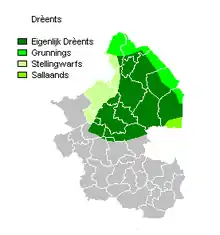Drèents dialects
Drèents (also Dreins, Dreints, Drents, Drints; Dutch: Drents) is a collective term for the dialects spoken in Drenthe, a province of the Netherlands. The dialects, which are still spoken by half the population of Drenthe, are Dutch Low Saxon variants.
| Drents | |
|---|---|
| Dreins | |
| Drèents | |
| Native to | Netherlands |
| Region | Drenthe and a strip of Overijssel just south of Drenthe |
Native speakers | About half the population of Drenthe (total 480,000) and a number of people in Overijssel |
| Official status | |
Official language in | Netherlands (as part of Low Saxon) |
| Regulated by | Provincial States of Drenthe (spelling) |
| Language codes | |
| ISO 639-3 | drt |
| Glottolog | dren1238 |
 | |
Dialects of Drèents
All the dialects of the province of Drenthe are classified as Dutch Low Saxon. The dialects from the north and the east (see below: 'Noordenvelds' and 'Veenkoloniaals') are somehow more related to Gronings, the dialects from the south-west are 'Stellingwerfs', and the dialects in a few villages along the southern border with the Grafschaft Bentheim (Germany) are considered to be Sallaans (because they have an umlaut in the diminutives).
The foundation Stichting Drentse Taol distinguishes seven main variants of Drèents within the province, based upon the research made by G.H. Kocks, the main editor of the Woordenboek der Drentse Dialecten (Dictionary of the Drèents Dialects):
- Noordenvelds
- Veenkeloniaols
- Zuudoost-Zaand-Drèents
- Zuudoost-Veen-Drèents
- Midden-Drèents
- Zuudwest-Noord-Drèents (Also see Stellingwarfs)
- Zuudwest-Zuud-Drèents
It also can be divided into Midden-Drents and Zuid-Drents.
Examples of usage
| Emmen dialect: | We moet'n nie zo haast'n. |
| Standard Dutch: | Wij hoeven ons niet zo te haasten. |
| English: | We do not have to hurry. |
| Northern Drenthe: | ien | twei | dreei | vier | vief | zes | zeum | aacht | neegn | tien |
| Southwest Drenthe: | iene | tweie | dreie | veere | vieve | zesse | zeum | achte | neegn | tiene |
| Standard Dutch: | een | twee | drie | vier | vijf | zes | zeven | acht | negen | tien |
| English: | one | two | three | four | five | six | seven | eight | nine | ten |
| Drenthe: | Ie kunt wel geliek hebb'n. |
| Standard Dutch: | U heeft gelijk. |
| English: | You must be right. |
| This article is a part of a series on |
| Dutch |
|---|
| Dutch Low Saxon dialects |
| West Low Franconian dialects |
| East Low Franconian dialects |